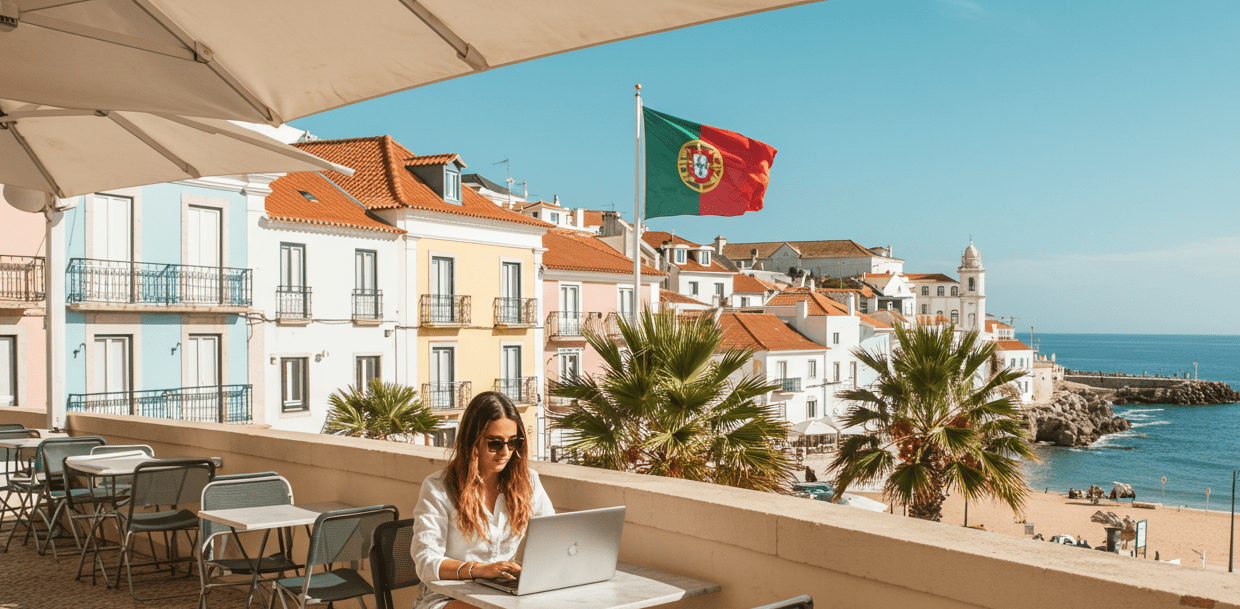
Portugal has quickly become one of the most attractive destinations for remote workers, freelancers, and expats. With its mild weather, affordable cost of living, thriving expat communities, and access to the Schengen area, the country offers a unique mix of lifestyle and professional opportunities. For many tech talents, the first step to making Portugal home is securing the right visa.
Two of the most popular options are the Digital Nomad Visa (D8) and the Passive Income Visa (D7). While both lead to residency, and eventually citizenship, they cater to very different types of applicants.
Settling Into Life In Portugal: The Early Months
Before diving into the details of each visa, it’s worth noting what newcomers often experience in their first few months. Moving legally doesn’t automatically guarantee access to every service right away. For instance, until your residence card is issued, you may have to pay out of pocket for healthcare, even though Portugal’s public system is excellent once you’re fully registered. Insurance is available and relatively affordable, but co-pays may still apply.
Another challenge is immigration bureaucracy. Due to recent backlogs, some applicants have had appointments delayed by several months, meaning it can take longer than expected to get your residence card. While frustrating, this is something to plan for. Patience is essential, as the system is evolving and gradually improving.
Language can also be a hurdle. Although many Portuguese speak English, official offices are often staffed by older citizens who may not. Bringing a translator, a friend, or requesting English-speaking staff can make the process smoother.
On the positive side, Portugal is incredibly family-oriented and slow-paced, offering a refreshing contrast to the hustle of places like New York or London. Work-life balance is deeply ingrained in the culture. People prioritize family, and the atmosphere encourages building friendships and enjoying life. Combine that with easy access to African and Brazilian food products, and many expats find Portugal to be an unexpectedly comfortable place to settle.
The Portugal Digital Nomad Visa (D8)
The D8 visa was introduced in 2022 to attract remote workers and freelancers with stable incomes. It is ideal for professionals employed by companies abroad, entrepreneurs, and independent contractors.
Key requirements:
- Proof of remote income: At least four times the Portuguese minimum wage (around €3,280 monthly in 2025).
- Three months of payslips or contracts showing consistent earnings.
- Bank statements for the last three months reflecting this income.
- A work contract or employer letter explicitly stating you can work remotely from Portugal.
- Accommodation proof (Airbnb or hotel booking for 30+ days is acceptable, even without upfront payment).
- Flight booking (not paid ticket, just a reservation valid at the time of your VFS appointment).
- Police clearance certificate (authenticated by your Ministry of Foreign Affairs, and later required again in Portugal).
- Valid passport and completed application forms.
Applications are submitted via VFS Global, which processes them on behalf of the Portuguese consulate. Processing times vary, but most applicants receive a response within 6-12 weeks.
The Portugal Passive Income Visa (D7)
The D7 visa is designed for retirees and individuals with stable passive income streams, not active remote employment. This could include pensions, rental income, dividends, or other recurring income that proves financial independence.
Key requirements:
- Proof of passive income equal to at least the Portuguese minimum wage (€870 monthly in 2025).
- Evidence of savings or recurring deposits to demonstrate long-term sustainability.
- Accommodation proof in Portugal.
- Police clearance and standard documentation similar to the D8.
Unlike the D8, the D7 is less about active remote work and more about proving that you can comfortably support yourself without needing a job in Portugal.
D7 VS D8: What's The Difference?
While both visas eventually lead to residency and citizenship, the main differences are:
|
Criteria |
D8: Digital Nomad Visa |
D7: Passive Income Visa |
|
Income Type |
Active remote work income |
Passive income (pension, rentals, dividends) |
|
Minimum Requirement |
~€3,280/month (4x minimum wage) |
~€870/month (1x minimum wage) |
|
Ideal For |
Freelancers, contractors, remote employees |
Retirees, investors, financially independent individuals |
|
Employer Letter |
Mandatory (must state remote work allowed) |
Not required |
|
Pathway to Citizenship |
Yes (after 5 years) |
Yes (after 5 years) |
Why Americans and Other Expats Love Portugal
Applicants from the U.S. have a slightly different experience. Since Americans can enter Portugal visa-free for 90 days, many choose to visit first, secure accommodation and a bank account, and then return home to apply for the visa. For applicants from other regions, the process can be more straightforward, you may not need to arrange a Portuguese tax ID or housing contract before traveling, as those steps often come later in the journey. Additionally, services are available to help foreigners obtain a Portuguese tax ID remotely for around €100–€150.
The main reasons Americans and other expats are flocking to Portugal include:
- Healthcare: Free or low-cost universal coverage after residency.
- Weather: Mild winters, warm summers, and plenty of sunshine year-round.
- Safety: Stricter gun laws and lower crime rates compared to the U.S.
- Affordability: Stronger purchasing power if earning a U.S. salary.
- Lifestyle: Slower pace of life, family focus, and vibrant expat networks.
Portugal’s D8 and D7 visas provide two clear pathways for those looking to relocate: one for remote workers with active income, the other for individuals with passive income. Both visas eventually unlock permanent residency and citizenship, making Portugal one of the most welcoming countries in Europe for long-term settlement.
Whether you’re a freelancer, digital nomad, retiree, or investor, Portugal offers not only legal pathways but also a lifestyle that balances work, family, and leisure in a way few countries can match.
Next Steps
If you’re planning a move to Portugal, now is the best time to explore your options and start preparing.
Reach out to eMigr8 today
WhatsApp: +44 7859 946409, +234 809 889 9883